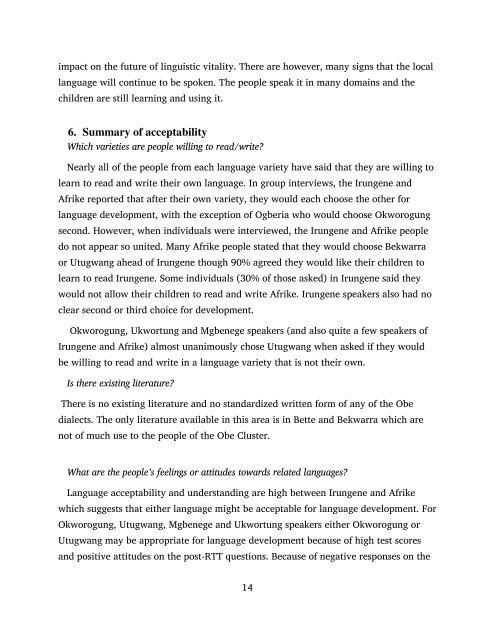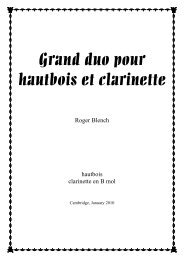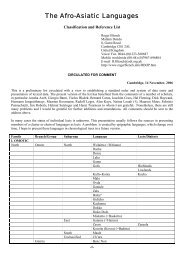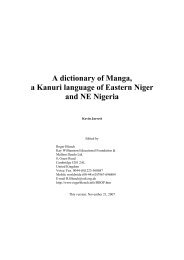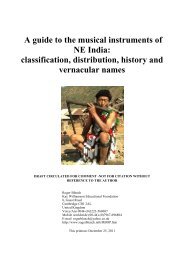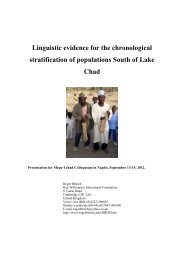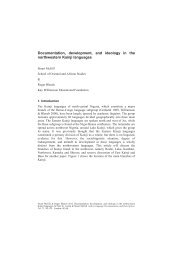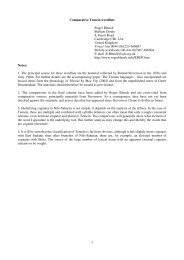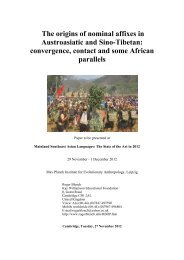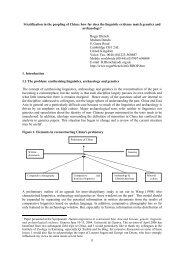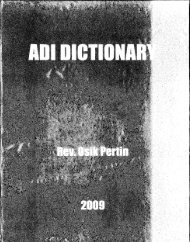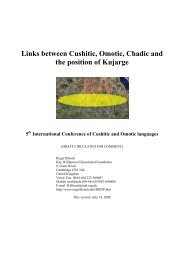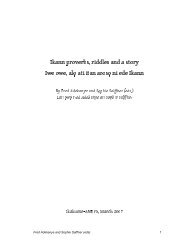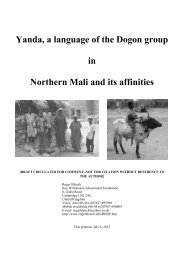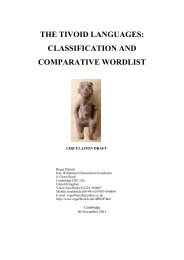A Sociolinguistic Summary of the Obe Cluster survey ... - Roger Blench
A Sociolinguistic Summary of the Obe Cluster survey ... - Roger Blench
A Sociolinguistic Summary of the Obe Cluster survey ... - Roger Blench
Create successful ePaper yourself
Turn your PDF publications into a flip-book with our unique Google optimized e-Paper software.
impact on <strong>the</strong> future <strong>of</strong> linguistic vitality. There are however, many signs that <strong>the</strong> local<br />
language will continue to be spoken. The people speak it in many domains and <strong>the</strong><br />
children are still learning and using it.<br />
6. <strong>Summary</strong> <strong>of</strong> acceptability<br />
Which varieties are people willing to read/write?<br />
Nearly all <strong>of</strong> <strong>the</strong> people from each language variety have said that <strong>the</strong>y are willing to<br />
learn to read and write <strong>the</strong>ir own language. In group interviews, <strong>the</strong> Irungene and<br />
Afrike reported that after <strong>the</strong>ir own variety, <strong>the</strong>y would each choose <strong>the</strong> o<strong>the</strong>r for<br />
language development, with <strong>the</strong> exception <strong>of</strong> Ogberia who would choose Okworogung<br />
second. However, when individuals were interviewed, <strong>the</strong> Irungene and Afrike people<br />
do not appear so united. Many Afrike people stated that <strong>the</strong>y would choose Bekwarra<br />
or Utugwang ahead <strong>of</strong> Irungene though 90% agreed <strong>the</strong>y would like <strong>the</strong>ir children to<br />
learn to read Irungene. Some individuals (30% <strong>of</strong> those asked) in Irungene said <strong>the</strong>y<br />
would not allow <strong>the</strong>ir children to read and write Afrike. Irungene speakers also had no<br />
clear second or third choice for development.<br />
Okworogung, Ukwortung and Mgbenege speakers (and also quite a few speakers <strong>of</strong><br />
Irungene and Afrike) almost unanimously chose Utugwang when asked if <strong>the</strong>y would<br />
be willing to read and write in a language variety that is not <strong>the</strong>ir own.<br />
Is <strong>the</strong>re existing literature?<br />
There is no existing literature and no standardized written form <strong>of</strong> any <strong>of</strong> <strong>the</strong> <strong>Obe</strong><br />
dialects. The only literature available in this area is in Bette and Bekwarra which are<br />
not <strong>of</strong> much use to <strong>the</strong> people <strong>of</strong> <strong>the</strong> <strong>Obe</strong> <strong>Cluster</strong>.<br />
What are <strong>the</strong> people’s feelings or attitudes towards related languages?<br />
Language acceptability and understanding are high between Irungene and Afrike<br />
which suggests that ei<strong>the</strong>r language might be acceptable for language development. For<br />
Okworogung, Utugwang, Mgbenege and Ukwortung speakers ei<strong>the</strong>r Okworogung or<br />
Utugwang may be appropriate for language development because <strong>of</strong> high test scores<br />
and positive attitudes on <strong>the</strong> post-RTT questions. Because <strong>of</strong> negative responses on <strong>the</strong><br />
14


